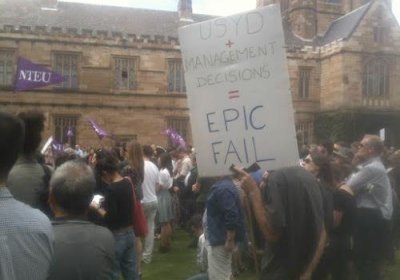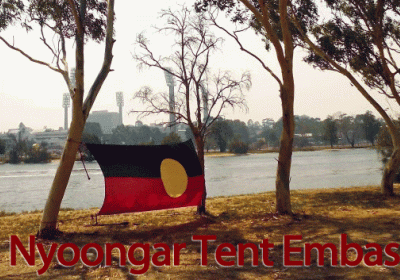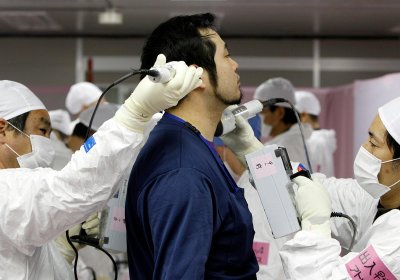All suggestions of an insipid and apathetic Sydney University political culture have been shot dead over recent weeks by an inspired campaign by staff and students to defeat Vice-Chancellor Michael Spence's plans to cut 340 university staff, and cut courses and the budget by a further $28 million.
Starting with a stunt at Orientation week, which disturbed Spence's opening address at the Great Hall, and a rally and march through the centre of the university, students have ensured that they've kept the pressure on Spence and his management cronies.
Australia
The recently released independent Gonski review into school funding reaffirms what many teachers and parents already knew. Current school funding arrangements are dysfunctional and inequitable and the failure to reform the way we resource our public schools has come at an immense social and economic cost.
Gonski’s recommendations are far from perfect and recommend continued public funding of elite private schools. But they do highlight the need for an immediate injection of funds into public schools.
The problem
The latest State of the Climate report by the Australian Bureau of Meteorology and the CSIRO was launched at a weather monitoring station on remote Cape Grim in Tasmania. The location was an apt choice for a report that has very bad news about Australia's continuing failure to respond adequately to the climate change crisis.
The Northern Territory has become Australia’s refugee detention capital. The federal immigration department’s new plan is to fund extra police for NT detention centres.
The immigration department, Australian Federal Police and the NT police agreed on March 12 to a two-year deal for 94 new police officers, worth $53 million.
NT chief minister Paul Henderson said it was “great news for the people of Darwin”.
Newly appointed foreign minister Bob Carr said in a January blog post: “As [NSW] Premier, I never saw a demonstration that didn’t hurt the side that mounted it. And I was never persuaded by a noisy crowd with a few placards.”
But on March 2, the same week he was appointed, the federal government gave a powerful confirmation of the power of protests.
The gas industry is fond of saying that burning gas for energy will help tackle climate change. Australian energy company AGL says burning coal seam gas (CSG) results in 50% less greenhouse gas emissions than coal. Industry advertising campaigns bump up that figure to 70%.
An Aboriginal protest march is being planned for March 28 to take up issues such as the government’s miserly stolen wages offer and the proposed deal that would extinguish Nyoongar native title in south west Western Australia.
Victorian nurses crowded into Festival Hall in Melbourne on March 16 to hear their nine months of struggle had reached a successful outcome.
After what the ABC said was Victoria’s longest running industrial dispute, nurses have won 14-21% pay increases and kept their nurse-to-patient ratios in return for minor productivity offsets.
Australian Nursing Federation (ANF) secretary Lisa Fitzpatrick said: “This is a bittersweet victory for nurses and midwives after an unprecedented industrial marathon with the Baillieu government to protect patient care and secure a fair pay rise."
Climate activists like Newcastle group Rising Tide have labelled December’s draft Energy White Paper (EWP), which charts the federal government’s plan for Australia’s future energy mix, a “black” paper. The group says the paper “plans to further expand fossil fuel extraction (both domestically and for exports) at the expense of renewable [energy]”.
Another company is following in the footsteps of Qantas by locking out its workers from March 5 to 14.
Sigma, a company that distributes pharmacy products to wholesale and retail customers, locked out 150 workers in an attempt to intimidate them into ceasing all industrial action. The workers are members of the National Union of Workers.
The workers walked off the job for 48 hours on February 23 after Sigma management told them that it would cut night-time shift loadings. Workers at both the company’s sites at Rowville in Melbourne and Shepparton walked off.
March 11 was the first anniversary of the Tohoku earthquake and tsunami in north-east Japan and the meltdowns, explosions and fires at the Fukushima nuclear plant.
The impacts of the nuclear disaster have been horrendous. More than 100,000 people are still homeless and some will never be able to return.
Homeless, jobless, separated from friends and family, the toll on people's health and mental well-being has been significant — one indication being a sharp rise in suicide rates. One farmer’s suicide note simply read: “I wish there wasn’t a nuclear plant.”
Community workers were granted long-awaited pay rises in a historic decision by Fair Work Australia on February 1.
Before this decision, the 16 previous equal pay cases tried to improve pay for sectors that employ mostly women, such as the community services sector. Every case failed.
The Australian Services Union waged a determined and ultimately successful campaign. This decision will give wage rises from 23-45% to youth support, disability, refuge, family support and social workers, and also clerical and administrative staff.
- Previous page
- Page 757
- Next page









